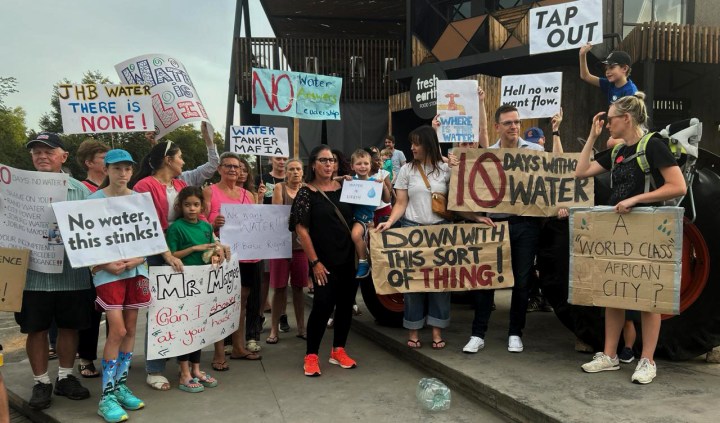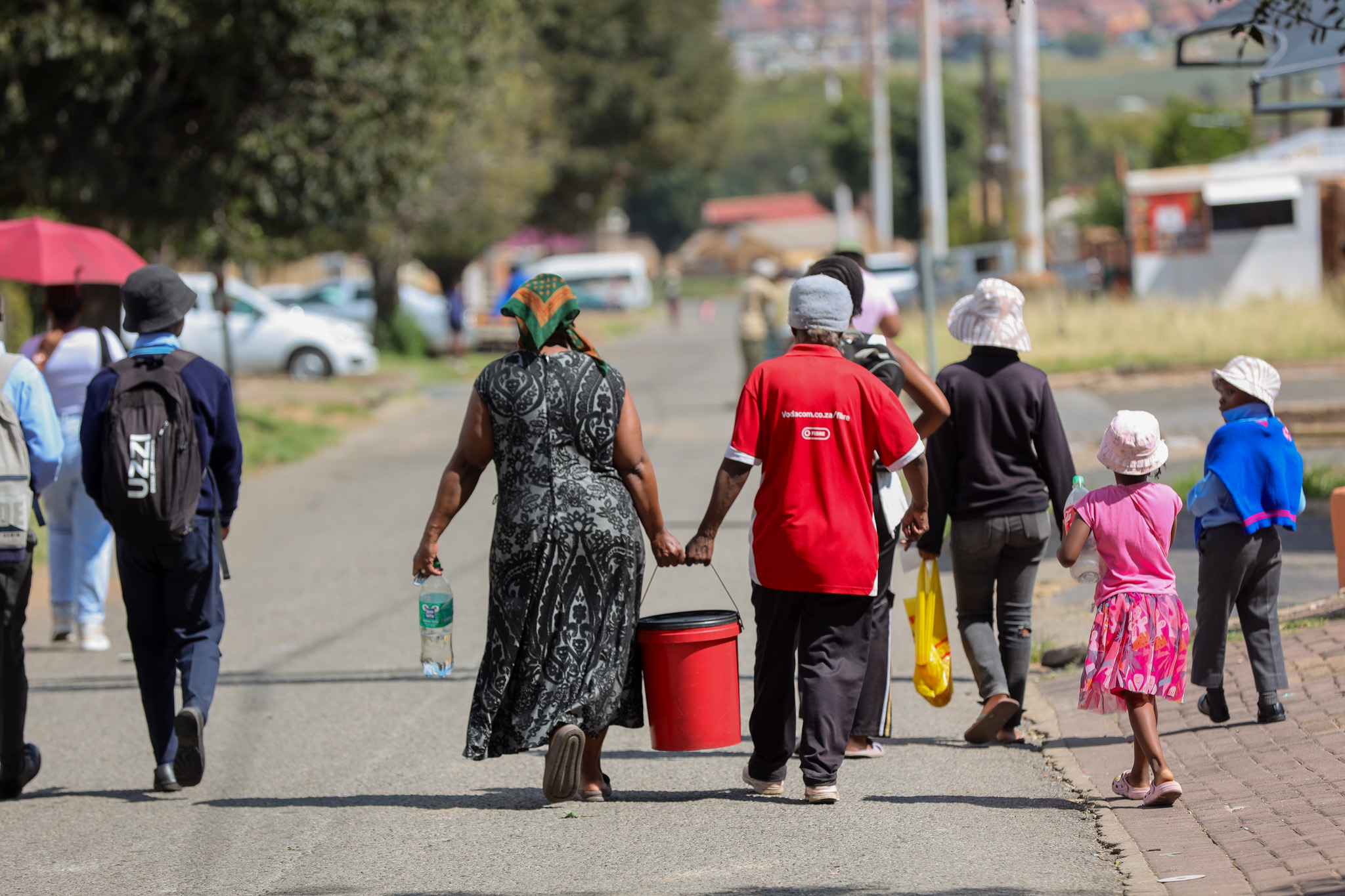NOT A DROP OP-ED
South Africa’s multiple water crises cannot be resolved by technical solutions alone

Sixty-four percent of the country’s sewage and wastewater treatment plants are at ‘high or critical’ risk of dumping untreated water into rivers and the environment.
Whatever Johannesburg Mayor Kabelo Gwamanda tried to tell Daily Maverick on 19 March 2024, the city finds itself in the midst of a severe water and sanitation crisis. Large parts of the city have been without water in recent weeks, and even after services ostensibly had been fixed, interruptions to the water supply persevered and spread wider, and lasted longer.
And Johannesburg is not alone. Once a reference point for good practice, its regional bulk water provider, Rand Water, warned Johannesburg, Tshwane and Ekurhuleni that its system was at high risk of collapse.
More nationally, in December 2023, the Department of Water and Sanitation’s (DWS) Blue and Green Drop reports showed that the declining quality and escalating losses of South Africa’s urban water and sanitation infrastructure have escalated in six of the other seven metros and in half of smaller municipalities across the country.
Beyond the metros, residents of a growing number of towns, districts and rural areas lack access to reliable basic services due to dysfunctional infrastructure and management systems.
This has been the case even in many formal settings, over and above where informal facilities like communal toilets and tap stands have been running dry. Some residents have resorted to using unprotected water sources, such as boreholes and contaminated streams.
The Blue Drop report shows that since 2014, when 44 water suppliers received Blue Drop status, this year only 26 did so, of which 15 were in the Western Cape. It also estimates that an average of 47% of municipal water in South Africa is currently lost as so-called “non-revenue water” due to leaking pipes, unreliable (or even no) water meters, illegal connections and insufficient revenue collection.
The Green Drop report found that 64% of the country’s sewage and wastewater treatment plants are at “high or critical” risk of dumping untreated water into rivers and the environment. Such service deficiencies are affecting more towns and local economies.
More financing and new investment alone will not resolve these problems in municipalities, unless the political economy of the water sector changes dramatically.
At national level, Water and Sanitation Minister Senzo Mchunu and director-general Sean Phillips acknowledge this, and seem more prepared than their predecessors to tackle the fundamental causes of the crisis. This is in sharp contrast to the previous DWS leadership’s emphasis on patchwork interventions – such as, but not confined to, deploying water tankers, which have since been associated by many with a new wave of corruption.
Water sector overhaul

Residents of Dube and Meadowlands, Soweto, carry water home on 15 March 2024. Greater Johannesburg has experienced successive water outages over recent weeks. (Photo: Fani Mahuntsi / Gallo Images)
In this seemingly reformist mode, Minister Mchunu told a recent conference on Johannesburg’s current water crisis that he wants “this thing to go”, emphasising the need for a water sector overhaul, including revising municipalities’ operational responsibility for water and sanitation service delivery. This may include legislative amendments, earmarking income from water provision for upgrading infrastructure, and involving private companies in infrastructure investment, maintenance and service delivery.
The politics of doing so has, however, long been a sensitive matter in South Africa and is likely to remain so. But the current DWS leadership at least seems clearer in its messaging about reform, including the need for private sector support.
Yet, political opposition to private sector financing and water services delivery will not easily disappear. For South Africa, following a global trend of introducing more private sector involvement in water and sanitation investment and service delivery, will require much political skill and an ability to convince potential investors that the government will stand by the commitments it makes to create a feasible and sustainable investment environment.
So far, the water minister has framed his reform proposals as a response to municipalities’ own acknowledgements that they are struggling to fulfil their water and sanitation mandate, but politically it will require a delicate balancing act, not only in dealing with trade union resistance, but also in the dynamics of a less than politically coherent government.
The technical know-how of municipal staff and leadership varies immensely among metros, and even more so in smaller municipalities. Technically, data from the South African Institute of Civil Engineering (SAICE) shows substantial numbers of engineers having left South Africa in recent years, and it is nowadays common knowledge that many municipalities have lost and failed to replace engineers in different infrastructure fields.
This continues to jeopardise service delivery and infrastructure maintenance, and complicates the tradeoffs and prioritisation needed to run local governments and the services they must deliver.
Political divisions at municipal level have deepened, so that there has been a demise of pragmatic assessment of problem areas and collaborative design of strategies to resolve them. Opportunistic coalitions have become commonplace, often breaking up or realigning around personalities or uncompromising political positions.
In such an environment, private investors and service providers may not exactly rush to smaller urban areas and their hinterlands. Addressing this will require a hybrid of approaches: combining public-private collaboration; innovation on the technologies for water and sanitation, beyond conventional toilet and treatment systems; and appropriate contextual interventions.
All of these choices require thinking out of the box, but South Africa also has been reluctant to opt for such changes.
Of the larger cities, Cape Town is the only metro not currently in the midst of a water crisis, but its 2016–20 situation showed that there is no room for complacency. It seems to have learnt the lessons from a few years ago, and although those lessons cannot simply be transferred uniformly to all metros, there are some pertinent messages relevant to other cities:
- Most importantly, Cape Town’s water department was headed by experienced, skilled management and staff, with access to largely credible data on water resources, service delivery levels and on the state of its infrastructure. This is not the case in all metros and the array of smaller municipalities that need attention;
- While Cape Town initially overestimated the potential of supplementary water resources, such as through desalination and more groundwater extraction, its ability and willingness to engage external local and international expertise helped convince them that there were no magical solutions. Its resilience plan thus benefitted from diverse perspectives and their opening up to a combination of approaches, including working with provincial and national government to address related climate sustainability issues;
- Cape Town also did not shy away from seeking international advice. This helped it to draw on lessons from abroad, both for managing infrastructure and service and on effective use of policy and practical lessons to deepen resilience and be proactive and prepared for responding to climate change risks and impacts;
- This does not mean that the internal processes all ran smoothly, but robust internal discussion and professional external advice greatly assisted Cape Town in prioritising and tackling issues like leak reduction, resource allocation, and pressure control; and
- The Cape Town water situation and the subsequent water problems in other metros have also highlighted that the relevant national government departments have not consistently been on the same sheet about service delivery modes, tariff levels and payment for water and sanitation services, and certainly not the risk assessments and possibly added value of the private sector.
The water challenges have also brought to the fore the growing debt owed by municipal customers. When municipalities fail to pay water boards, the latter cannot pay the DWS for raw water, which has ramifications not only in South Africa, but also when it means that it becomes difficult to cover bills for transboundary water, especially from Lesotho.
Addressing this issue has been a political logjam as the national policy and constitutional provision for free basic water to serve the poor has become mismanaged and abused, yet cannot be managed as data has become less reliable.
It’s no surprise then that public willingness to pay for poor services, and weak billing and revenue management has damaged water management severely. The political resistance to some of the measures applied in many other countries – such as the use of prepaid meters – has deprived South Africa’s water service providers of resources that have become more common use in a growing range of countries.
There also is a hurdle of a reluctant government party struggling to improve its poll prospects amid rising costs of living related to food, electricity, fuel and other costs. Bold as the current top DWS leadership may be on countering non-payment, the governing party’s weakening poll prospects may well pose a continued disincentive for firmer revenue collection, even more so in the light of the wider rising costs of living.
This means that a substantial turnaround in water services delivery cannot be resolved by technical solutions alone. Whatever the political party, or whoever the leadership at the relevant levels of government, water (and sanitation) requires a lot more rational thinking, leadership, technical skills and responsible citizenship, far beyond the narrow political interests and games that have skewed this sector – and thereby South Africans at large – so severely. DM
Chris Heymans is an independent adviser specialising in the political economy of cities, urban development and water and sanitation. In 2016, he was team leader for a World Bank report, Providing water to poor people in African cities effectively: Lessons from utility reforms, in which Durban was a case study.






Who could have guessed that keeping kleptocommies in power for 30 years would have consequences. Way to go voters.